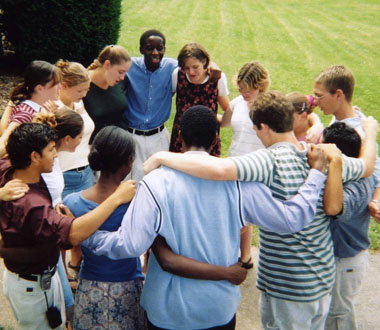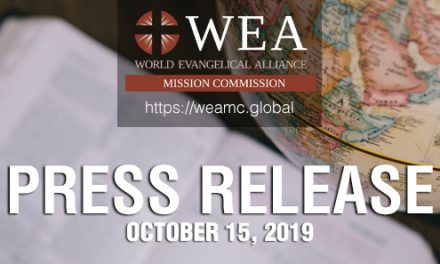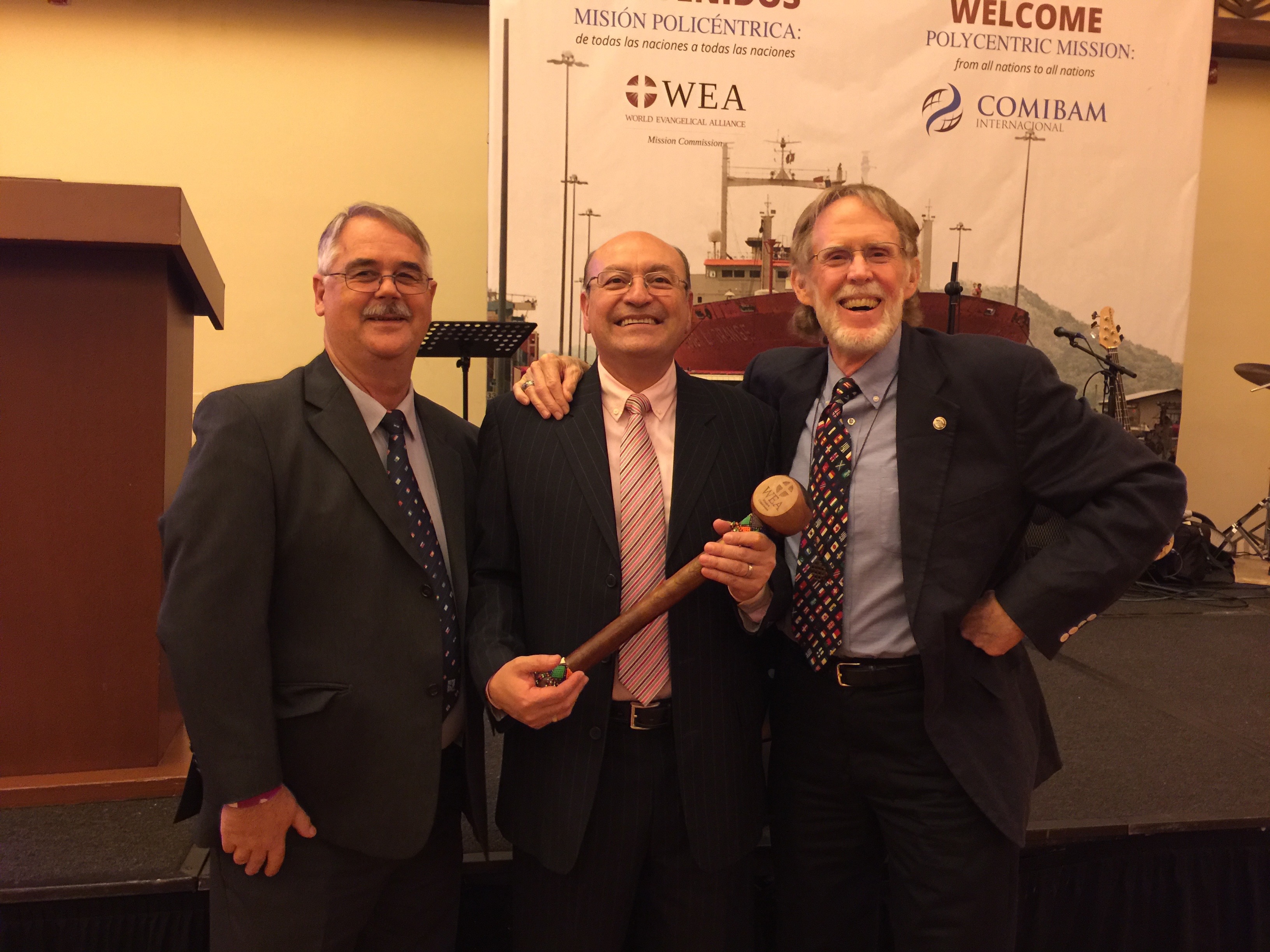LEADER’S MISSIONS FORECAST 2021
[55 Minute Read]
Dear fellow participants in God’s mission,
Grace and peace to you in the name of the Lord Jesus Christ.
The year has almost gone and we are on the cusp of our (Western) Christmas celebrations. It is an appropriate time to reflect on some trending issues and consider their affect on global missions. In short, from my perspective the global pandemic continues to frustrate the plans of missionaries and missions around the world. 2021 has been a year of great suffering and set-back in terms of health and well-being, with a resource crisis on the horizon. The stress created by the pandemic has amplified competing social and theological convictions, resulting in increased polarisation. Geopolitical instability is also growing, with potential to be an additional threat to missions strategies. And yet, God’s purposes prevail. The question remains: are we fulfilling or frustrating those purposes? To help us frame our answer, let us consider Mary’s song.
Inversion
Taking by faith all that the angel Gabriel had told her, Mary accepted the marvellous things the Lord had done for her. She praised God and rejoiced, acknowledging the God of her forebears as her Saviour. She identified her own position as lowly but considered herself blessed because, out of nowhere, God took notice of her. She sang of a God who shows mercy to generations of the faithful, and a God who keeps promises. What were the promises that this lowly teenager recounted in verse?
Prophesy
Mary declared that, by blessing her with child, God had fulfilled promises to Israel that the Lord would scatter the proud and haughty and bring down those who assume rulership. Simultaneously, He would promote the humble. God has ‘flipped the script’. To further illustrate the practicalities of the Lord’s actions, she sang that He would satiate with fine things those who are in want, but those with much will be left wanting. Presumably, the wealthy would retain what they have, but it would be unsatisfying and paltry compared to what the Lord promises to provide for people who look to Him for their deliverance. Mary may have declared these things in the present continuous tense, but the great inversion obviously did not happen immediately. For the most part, it is still not apparent today. As is common in the prophetic tradition, it is an ongoing process—fulfilled, being fulfilled and yet to be fulfilled.
The proud will be humbled, and the humble will be elevated. Those who “imagine in their hearts” (KJV) that they are in control and have control over others will see that they control nothing of eternal consequence. Conversely, those who are tossed around and weighed down by the whims of the wealthy, privileged, and powerful will receive eternal satisfaction and an inheritance of “good things”… if they hold to their dependence on God.
Contrary to the assumptions of some, the promise of God’s blessing is not for the poor as such. Mary’s song reiterates the perspective of the entire biblical canon—they are promises reserved for those whose desperate dependence is on God. Those in material need are certainly more susceptible to leaning on God, but the promise is specific to the covenant—to Abraham’s children. As we eventually find out in the New Testament, these are children of faith rather than bloodline, and everyone without exception is invited in.
We Christ-followers, most of us Gentiles, are included as children of Abraham (Romans 9:30). That in itself is evidence of a great inversion. Many of the powerful amongst the Jews, proud of their heritage and smugly confident of their inheritance (as evidenced by the teachers of the Law in Jesus’ time), were left behind in God’s purposes as God-seeking Gentiles believed in the resurrected Christ and received the promised and ever-present Wonderful Counsellor, God’s Holy Spirit.
Within Mary’s song is a warning to us all though. Christian leaders can become as smug as the teachers of the Law were. The Magnificat is a warning to all who would presume to rule over others. Church history records many inversion events that had the powerful and influential within the Church running, while the marginalised ascended. The Protestant movement is one such occurrence. However, after 500 years of ascendancy, the movement (which includes Evangelicals) appears to be being brought down, at least in its Global North form. Its primacy is being replaced by new expressions of faith that are emerging among the marginalised in the Majority World. Christianity is now a Majority World religion, growing in prominence amongst the poor across the earth who are desperate for God’s deliverance, even as the Western Church is struggling to stem its decline—its influence diminishing despite its best evangelistic and diplomatic efforts. This is not an opinion. The empirical data tells this story. We have reached the inflection point of another inversion
Inflection
An “inflection point” is a geometric term that marks the place on a chart where a data curve starts to take a significant change in direction (e.g., from growth to decline or stagnation to growth etc.). This is not to be confused with the business term “tipping point”, which is more related to finally getting an uptake or return on investment. We have also become accustomed to speaking of “paradigm shifts”, but they tend to be slow moving changes of perspective or frames of thinking that solidify over decades. An inflection point is not directly influenced by anything we do or the way we think, it is an evidence-based point where data shows that a shift has happened. It does not indicate why or what influenced the shift. When it comes to social shifts, the forces influencing changes are many and complexly interrelated. It is best left for social historians to ponder.
We live in an age where data is currency and its collection and analyses in real-time are big business. The missions ‘industry’ is woefully unprepared for the data economy, let alone adequately collecting and analysing data for God’s glory. Missions research tends to be narrowly focused, such as academic theses or specific internal investigations into a missions issue (as the Mission Commission has done in the past with Member Care and Missions Mobilisation). We should also look to analyses outside of the missions community to reveal what is happening in the wider world. As I do so, in keeping with Jesus’ warning to “first get rid of the log in your own eye” (Matthew 7:5), I will limit the scope and implications of this paper to the inflection point of inversion happening within the global missions community.
Across numerous metrics, COVID-19 is marking a global missions (indeed, a global Church) inflection point in history. It is not so much that the change has happened unexpectedly, but that the pandemic has both amplified and awakened us to the fact that things have changed. The data reveal significant changes to our shared global reality and global missions with it.
Purpose
As I reflect afresh upon Mary’s song at the end of 2021, in the context of the fresh COVID-19 Omicron surge, I echo the confession of many missions leaders in acknowledging that we have been and are being humbled by this global pandemic. It is forcing us to reorient the “imagination in our hearts” and renew our desperate dependence upon God in our world’s persistent unpredictability. Furthermore, God has done this, for God’s purposes.
I am not suggesting that God has orchestrated the plague, but as with all things, God uses crises for the good of those who love the Lord and are called according to His purposes (Romans 8:28). The key here is to discern what God’s purposes actually are, beyond the missions platitudes. In what ways is God’s great inversion in process as we pass the inflection point? Who are the proud being scattered and brought down and who are the needy being raised up in the global missions community to fulfil God’s purposes?
Lately, I find myself reflecting more on God’s purpose than God’s mission. Although it is subtle, there is a difference between the two. That is not to suggest mission is not important, but if we prioritise God’s mission without appreciating God’s purposes, we will fail to correctly discern our role and responsibilities in the new world ahead of us.
The word “mission” carries with it an implication that we are sent to do something. This is ἀποστέλλω apostellō in the biblical Greek, which is rendered in Latin as missio. In contrast, “purpose” suggests meaning more than method; that is, the reason why something is happening or will happen. In the biblical Greek this is πρόθεσις prothesis, the intention or determination that precedes action (e.g. as in Ephesians 3:10). I wonder if we read the Bible through the lens of purpose (why/intention) more than the lens of mission (what/action), could we better discern the next era of global witness for God’s people around the world? For example, circumstance may be forcing an inflection point change in our understanding of mission, but God’s purposes still prevail. So, what does the data suggest is changing?
Pressures
Through this period of humbling, traditional missions organisations and border-crossing missionaries are losing some of their agency, their ability to achieve the goals to which they aspire. We all know the frustrations. Borders have been raised, travel has been restricted, everyone now requires an additional passport—a valid vaccine passport—to help protect themselves and those they intend to visit from COVID-19, and permission for expatriates to dwell longer-term is being restricted in more nations. Furthermore, increasing national, indigenous, and sub-culture identity formation is escalating intolerance of the imposition of ideas from the ‘outside’.
We hoped access limitations were just temporary frustrations. After all, we adapted to the travel restrictions that emerged in the wake of the September 11, 2001, event in New York. Evangelical missions strategies, which grew out of the 1970’s and accelerated in the 1990’s, were soon back on track and, in certain cases, accelerated (e.g., ministry to Muslims).
In 2020, we hoped the world would open up again once the vaccine rollout was underway in 2021—plans for gatherings were locked in, missionaries remained or returned to their fields, and donations spiked for traditional missions organisations as people with means responded generously to the needs created by the pandemic. Giving money was at least something they could do, and missionaries were close to those who needed assistance. As often happens, a sudden crisis could be leveraged to gain missions resources.
Then came the Delta variant, and now Omicron, and the next, and the next, until we eventually get to the point where vaccines and therapeutic treatments prove to the health authorities that they can downgrade the pandemic to an endemic illness—one that we learn to live with and one that no longer causes severe ill health, for those who can afford treatment that is. Pfizer’s experts estimate that we will not reach an endemic phase globally until 2024. In the meantime, our missions strategies either stall and die or adapt to new realities.
On the economic horizon, financial futurists warn of a coming global storm—a typhoon of accelerated inflation. In the Global North, government stimulus packages maintained business confidence and fuelled spending, but COVID lockdown measures caused supply chain disruptions and increased freight costs, thereby increasing prices as demand greatly exceeded supply for certain goods. Furthermore, organisational specialists are speaking of “the great resignation”, where workers—those who can afford to do so at least—are leaving their jobs to find meaningful work in high-wage, high-growth career paths, with few willing to replace them. This is a situation affecting churches too as political and philosophical perspectives polarise congregations and pastoral burnout creates an unprecedented number of church leader vacancies in nations such as the USA.
On the theological front, we are experiencing a major shift as the democratisation of knowledge, facilitated by digital technologies, influences the global Church. For better or worse, individuals and groups can now emancipate themselves from dominant, imposed, and oppressive systems of ideas and their supporting structures. Authorities are undermined and people of all religions and other backgrounds are “deconstructing” their beliefs. In worst case scenarios, heresy and conspiracy theories multiply, but it also enables biblically authentic global theologies to flourish, no longer suffocated by a Euro-American Evangelical orthodox consensus. A new sense of biblically authentic theological freedom is emerging on the ‘margins’. Our historic inflection point is revealing an inversion.
Generationally, this inflection point has revealed a major shift in global concerns. Environmental sustainability and climate change have joined humanitarian justice and poverty alleviation as locations of systemic sin, which demand intentional theological, Church, and missions engagement. Inclusion and equitability are associated with these concerns, which can no longer be ignored.
We are ending 2021 with missions facing the possibility of further prolonged travel restrictions, increasing insurance costs, missionaries with significant trauma care needs, an economic downturn that will reverse the donor optimism of 2020, increasing resistance to imposition, challenges to narrow thinking about missions, and a desperate job market potentially luring expatriate ministers back home with attractive remuneration packages and work-life balance options. Is this not a significant inflection point for missions?
Perspective
The Lord is frustrating the plans we have “imagined in our hearts” and the strategies that global missions boards have invented and invested in to fulfil those plans. Proverbs 19:21(NLT) feels like an “I told you so”, from the Lord: “You can make many plans, but the Lord’s purpose will prevail.” The Lord’s purpose prevails, not the Lord’s mission. They are not mutually exclusive, but I fear our comprehension of God’s mission has become too defined in certain Evangelical circles and it will inhibit the innovation necessary for us to participate in God’s purposes more effectively (and biblically) in the new era ahead. Is it possible that we have dabbled in a little too much in eisegesis as the global missions community has been attempting to motivate God’s people to achieve a certain type of mission rather than equipping them as disciples to serve the Lord’s purposes?
For example, consider the way Evangelicals have understood “sentness” for the past 240+ years. The interpretation developed within its colonial expansionist context, such that we now too easily interpret apostellō to mean crossing a divide of significant difference—from “home” to “other”. This is implied by what we understand to be “cross-cultural” for instance. If our ability to cross borders or cultures continues to be hindered because of this pandemic and its long-term impact, are we no longer sent? In John 17:18, Jesus located the destination of his and our sentness as ‘into the cosmos’ or physical world. As He was sent from the Father’s place to the world, so ALL who follow Him are, by default, sent from our place with God and one another into the wider world—wherever the Spirit of God leads us to make our habitation. Sure, Paul and Jesus’ disciples travelled in fulfilment of their specific apostellō calling, but they are the exception in Scripture, not the rule. Those who received each of the epistles were multiple thousands of homebound disciples, dutiful citizens of the cities or regions in which they came to know and witness to Christ (e.g., Rome, Galatia, Corinth, Colossae, Philipi, Ephesus, Thessolonica, Laodicea, Smyrna, Pergamum, Thyatira, Sardis, Philadelphia, and more).
The overwhelming evidence is that the vast majority of Christ’s followers throughout history and even today do not permanently leave their hometowns let alone their home nations. Does that indicate widespread disobedience to the Lord’s commission? Or could it be that Evangelical missions of the past 240+ years have imposed their Empire expansion assumptions onto the Father’s sending of the Son? Could we be locked into a particular interpretation that will hinder us from participating in God’s purposes during, and as we emerge from, this major turning point in human history? What if, as Jesus’ disciples, we were enacting our sentness whenever we interacted with wider society beyond the bounds of our covenantal communities in-Christ (churches)? How might that reorientation influence our participation in fulfilment of God’s purposes? What does God’s mission look like from that perspective and how might it allow for innovative methods to emerge as we navigate our way into the future of missions?
Innovation
‘Innovate’ has become one of those trendy terms over the past 20 months of the pandemic, like ‘pivot’, ‘unprecedented’ and ‘uncertainty’. Peter Drucker’s “innovate or die” adage is often quoted, but within missions and Christian ministries in general, rarely is it well understood. In his book, The Innovation Crisis, Ted Esler, leader of Missio Nexus, the missions alliance in the United States, laments that they have struggled “to find contemporary examples of innovative ministries.” (p16). He goes on to define innovation as, “the use of something new to create solutions. It can include invention, the creation of something new, or it can be a mixing of existing things to create something new.” (pp. 14-15).
While businesses that can afford to invest in complex research and development can adapt ahead of an inflection point, successful innovation is more often a happy accident. Another well-worn proverb is, “necessity is the mother of invention”. Innovation tends to emerge from a place of desperate need rather than intentional change. Motivation to make innovative shifts is not there until the way we have done “it” before no longer works. As we consider the implications of a coming inversion beyond this inflection point, missions leaders had better start looking for the new ways to do “it” (whatever their “it” is) if their organisation is going to continue to serve the purposes of God going forward.
Problems
Confronted by stories of people without Christ in newly colonised nations, sending organisations were created to send and support missionaries to bring those people the gospel and help them access its perceived benefits—usually “civilisation” as defined by the colonisers.
Confronted with a call to stop sending missionaries to nations with established churches, the Evangelical missions community discerned new “unreached” fields for which to raise missions resources.
Confronted with declining donor support (or a distaste for fundraising), missionaries started marketplace businesses in an attempt to generate funds to enable them to carry out their ‘mission’, or they found a professional job that puts them among the people they felt called to minister to.
Confronted with missionary trauma, missions organisations developed member care departments and other care services multiplied to meet demands.
Confronted with declining long-term missionary commitments, organisations restructured to manage short or medium-term missionary sending and remote/serial short-term missions service.
Confronted with rapidly growing indigenous movements to Christ in formerly unreached nations, cross-culturally trained expatriate missionaries positioned themselves as guides, coaches and, in more traditional settings, teachers and mentors.
These confrontations and their matching innovations are, of course, greatly simplified. There are complex social realities behind each of the illustrated responses, but the point is made—problems generate innovations (for better or worse).
Confronted with overwhelming poverty, human exploitation, uncontrollable diseases, inter-tribal and civil conflict, environmental abuses, climate crises, mental and emotional anguish, and persecutions, all amplified by the COVID-19 pandemic, what will be the innovative response of the global missions community as it assists the global Church to fulfil God’s purposes in the cosmos? How will the whole Church take the whole gospel to the whole world in response to these problems?
At the Missio Nexus 2021 Missions Leaders Conference, “Innovate 2021”, Patrick Fung (OMF International Director and Mission Commission Executive Committee member) presented a biblical and historical reflection on innovation as it pertains to the purposes of God. He noted that, “Christian innovation ultimately is not so much about a new method, but rather gives a new insight, fresh meaning, a new way of seeing the world while embracing the unchanging gospel, God’s truth expressed by traditions.” (Patrick’s transcript notes, p1). COVID-19 should be opening our eyes to new ways of seeing a hurting, desperate, divided world and the gospel-led solutions required. Not from the perspective of the proud, “in the imagination of our hearts”, but from the perspective of the humble, whom the Lord calls and sends to serve His purposes, as God did with Mary. We are all containers of His grace.
Pioneers
If we dare to move on from our Evangelical missions paradigm of 240+ years, we will see that God’s purposes are being fulfilled in exciting new ways by people we would not expect to be considered “missionaries” in the traditional sense. For example, indigenous followers of Christ among formerly unreached people who have been instrumental in leading thousands of their countrymen and women come to know Christ from a different religious background. Justin Long, a missions researcher, calculates that 1% of the world’s population belongs to one of 1,350 relatively recent indigenous movements to Christ—that is, ~70 million new believers in fewer than two decades.
Migration is another locus of innovation that too few missions organisations are adapting to. In the late 2010s Majority World Christians migrating to the Global North were recognised as revitalising our faith in post-Christian nations. This has unfortunately been called ‘reverse missions’, but such terminology continues to privilege the Global North in the narrative and does this phenomenon a disservice. Those who are promoting their faith with a spiritual dynamism and confidence foreign to their new locations are effectively migrant missionaries, whether or not they serve in a recognised religious capacity.
It should be noted that this tends to be a one-way flow. People do not intentionally migrate toward discomfort unless there is sufficient motivation to do so. Traditionally-sent missionaries do not migrate permanently to the Majority World (unlike many missionaries of the colonial era). The new era of missions ahead of us will challenge our modern “expatriate” tradition of sending. But the question remains, if the only way to follow God’s leading to enter and minister in a foreign land is to migrate permanently, how readily will Westerners or the otherwise well-to-do answer such a call?
COVID-19 has greatly inhibited official migration for the time being but the refugee and asylum crisis has accelerated in 2021, affecting for instance the USA (1.7 million) and Europe (a 70% rise compared to 2020). It is estimated that 84 million people, including 35 million children, were forcibly displaced by mid 2021. With geopolitical tensions and power-posturing, civil wars and unrest, economic crises, and climate change impacts growing and likely to motivate more people to seek a better life for themselves and their children elsewhere, the opportunities and need for ministry among diaspora on the move is only going to increase.
Displaced people experience unfathomable tragedy and trauma, but among these marginalised ones are those fulfilling God’s purposes, even as they flee/relocate. Our traditional Evangelical missions lenses may have blinded us to them, but communities of displaced people already have missionaries among their number. What innovations can the global missions community create to equip these refugee servants of Christ and enable them to achieve the purposes to which God has called them even in such dire circumstances?
There is another type of destination that millions of people throughout the world are escaping to. This too is both a context for missions activity and a source of missionaries if we have eyes to see them. That place is the virtual world. JP Arceno, the Mission Commission’s Synergist (issues leader) for Tech, states that 61% of the world’s population is connected online in some form. That is 4.8 billion (let that number sink in) internet users. Outreach, evangelism, missions—whatever you wish to call it—is happening in online gathering points among a huge pool of human beings who are otherwise unreachable with the gospel, but this context is not yet recognised in mainstream missions consciousness beyond our static information sharing sites and apps.
Emerging virtual reality and holographic technologies are creating new opportunities for interactive access to millions (or billions even) with the gospel. Unless the tech we’re already using manages to keep pace, within 5 years we will look back and laugh at how we maintained some semblance of community in two-dimensional space via Zoom and live video feeds.
As the costs of access decrease, how will missions adapt to these new realities? What new methods are needed to convey the gospel message in meaningful, whole-of-life transforming, and Christ-centred community-building ways? Who will invest in gospel initiatives that help Christ-followers serve God’s purposes in these cyber spaces? Furthermore, who is recruiting and releasing ‘digital natives’ to take the lead in developing missions theologies, practices, and strategies to see the gospel incarnated (yes, incarnated) via virtual realities? For now, we would do well to look to pioneer ministries like FaithTech and Indigitous for guidance.
It is all very well identifying new vistas for missions service and innovating ways to meet new social and environmental problems being brought into focus by the emerging generation of leaders, but one of the biggest issues that illustrates our inflection point in history is that of reconciling difference and understanding unity in contexts of systemic imbalance. What does it mean to belong, and how does it relate to the future of missions?
Inclusion
Prior to our point of inflection, harmony meant something like “do not rock the boat”. A US American in a predominantly Australian and New Zealander missions group, may have experienced their complaints and suggestions falling on deaf ears (or, more likely, mercilessly ridiculed). A woman with leadership gifts would be restricted to sharing those among the locals and not presume to lead others within her missions group. If an organisation determined their international language was English, any non-English speaker seeking to join would need to learn it before they learned the language of the people they wished to minister to. These situations and the like, where majority rules or rules rule, are no longer acceptable.
Privilege
The pushback is related to the democratization of knowledge and the undermining of objective authority as the paradigm shift toward relativism is cemented. Today, whenever a system inhibits the flourishing of a person or group, according to that person or group’s standards, that system is open to be questioned. It is pointless lamenting this turn or trying to fight against it. It has happened. Adapt. Just as the Church has adapted at inflection points throughout Christian history.
Homogeneity (living with people of like mind) is not an option in cosmopolitan societies. Even people who live in communities with others like them are exposed to difference online or via other media. Withdrawal or retreat into ‘sameness’ leads to stagnation (or worse) not growth. As an example of how dangerous the lack of diversity can be, consider online echo chambers that are a well-known source of toxically antisocial behaviour.
Our new era is dominated by an attitude of ‘each to their own’, an attitude that is increasingly global due to our interconnectivity. This is led by the central core value of the individualistic ‘free world’: personal choice. Except, that does not work when people from diverse backgrounds, with diverse opinions are thrown together into a community—whether a neighbourhood or a missions group. As the COVID-19 vaccine campaigns have highlighted, there are necessary limits to the privilege of personal freedom when the wellbeing of an entire society or group is at stake. Sometimes it is necessary to relinquish one’s own preferences for the benefit of others or the whole. While many societies struggle to learn this, the New Testament writers believed that it should be habitual for followers of Christ.
A missions colleague once told me, “If you’re feeling comfortable in the group, that’s a problem.” It is a problem because you are likely to be enjoying privilege in the situation. It reveals that you are part of the dominant perspective and have the most to benefit from your easy participation. There is a disciple-growing case to be made for every participant in a group of believers to experience discomfort as part of their participation. Our exposure to difference matures us as believers.
Todd Johnson and Gina Zurlo confirm that, in 2021, 47 percent of the global missions force is from the Majority World. This is a dramatic rise from just 12 percent in 1970. This should not be surprising, since Christianity itself has been a Majority World religion from the turn of the century. If the Global North continues its trajectory of missionary decline, we will very soon see an inversion—missionaries from the Majority World in the majority. We could debate who Johnson and Zurlo count as a missionary, but to what end? Are we merely seeking to defend a position of dominance in the global missions community? Is there resistance to Majority World missionary inclusion? Or more to the point, could there be some fear of what might happen if Majority World leaders increasingly took control of the missions narrative… and resources?
Reinhold Titus, an international missions leader serving with OM, completed his Redcliffe College MA this year with a thesis entitled, Fostering Globally Inclusive Organisations: Exploring Inclusivity in Western Founded Global Mission Organisations through the experiences of senior African leaders serving in them. His analysis of qualitative interviews with 11 African missions leaders is a revelation… and an indictment.
As is usually the case, a thesis reveals merely the tip of the iceberg uncovered by the researcher. If a phrase makes the cut, it is significant and representative of all that cannot be said. Fortunately, I had the privilege of discussing the research with Reinhold and I also know the lived experience of many of his research participants. This phrase early in Chapter 5 summarises much, “One of the key barriers identified through this research was Western cultural superiority, tied to factors including the Enlightenment, colonialism, and others. The data reflected Western organisational members’ superiority mindset and Western dominance in leadership and decision-making, which led to silencing of (Majority World) voices.” In addition, “the concept of Western culture, practices, and standards being assumed as superior and normative (commonly now known as ‘whiteness’) frequently came up in the interviews.”
Early in the pandemic, issues of racial inequality arose afresh from a flashpoint series of events in the United States of America sparked off by the unjust deaths of Breonna Taylor and George Floyd in police custody (March 12 and May 25, 2020 respectively). The ensuing protests sparked a chain reaction that spread “Black Lives Matter” protests around the world.
During this period, the Mission Commission crafted a statement on Diversity and Inclusion to confess our shortcomings and record, in no uncertain terms, our biblically-informed position on these matters. Several other missions organisations, mostly from Europe, made similar declarations, but they were few and far between. Perhaps missions organisations, as ethnically diverse as most now are, think they are doing just fine. Unfortunately, the research reveals that is not the case
Prescription
F. Lionel Young III is another researcher who published findings this year. They included revelations of systemic and historic racial inequalities in missions organisations. His conclusions were published in book-form as, World Christianity and the Unfinished Task. An excerpt from the book was released this month as an article in Christianity Today. In the article, Lionel notes that “It is important for Western Christians who are engaged in world missions to understand that white supremacy in all its forms has been rejected by the non-Western world.” Furthermore, and this is worth quoting at length,
Christians in Africa, Asia, and Latin America want (and deserve) to work with the church in the Western world as coequals in the gospel for the cause of global missions. Church leaders in the non-Western world are keenly aware of the history of subjugation that they and their forefathers have endured. They do not want to be ignored, bypassed, looked down on, or patronized by the Western church—arriving in their country to carry out their work independently as though no African, Asian, or Latin American church actually exists. They want the Western church to serve with them in common witness. They also want Western church leaders to acknowledge them, respect them, and listen to them. They want Western Christians to first understand their needs and then come and serve alongside them.
At our inflection point in global history, Mary’s song must challenge missions organisations and missions leaders to seriously wonder if we are the proud that God is bringing down in our contexts. If we are the ones to be scattered as the great inversion affects Christian missions. There is one way to ensure that we are not. It is the prescription Dr Luke writes just two chapters after his record of Mary’s song. A prescription delivered in the voice of John the baptiser… repent! Let Luke 3:7-18 serve as a warning for those with eyes to see and ears to hear. As the crowds asked, “What should we do?” when they heard John’s rebuke, note carefully how John explained to them what repentance looks like. Repentance is a form of innovation. A problem is highlighted that demands a solution. The solutions John proposed are practical, just, and directed in favour of the marginalised who are oppressed by those being challenged by the prophet. Missions leaders, we need to “go and do likewise” (Luke 10:37).
Conclusion
I have never known Mary’s song to be as popular as it is right now. It seems to be the favoured passage in most end-of-year updates that I have received from believers, as well as featured in numerous social media posts. Perhaps it is a passage especially pertinent to Christmas time at an inflection point, when there is heightened attention on injustice. Whenever I see a concentrated cluster of interest like this, I cannot but conclude that the Spirit is saying something to the Church. Each commentator has a slightly different perspective of who is being pulled down and lifted up, but few identify themselves as the proud. Yet, the healthiest way to read the passage is with the fear of the Lord and a penitent heart. How is my privilege negatively affecting those to whom I am sent? Who are the poor and marginalised, relative to my social and economic standing and privilege (for there will always be people more disadvantaged than ourselves)? How can I sacrificially serve the purposes of God as the Lord continues His great inversion?
We ALL carry a sense of entitlement; it is part of sin’s influence in us. We must rid ourselves of it as we move beyond the inflection point into the future of missions. An inversion is happening. It is amplifying the need for greater inclusion. Only greater inclusion will help the global missions community and its subsets be successful in innovating for God’s glory and the world’s well-being in the days ahead. Our ministry in the world is one of reconciliation, after all (2 Corinthians 5:18). This is the purpose of God—to reconcile all things under Christ’s shalom. The inclusion research discussed above implies that there still exists a strong sense of entitlement by (‘white’) missionaries from Europe and its global diaspora. But the victims of exclusion carry just as much entitlement. It may be entitlement unfulfilled, but it is entitlement nonetheless. One of the first marks of a disciple is that the Holy Spirit tempers our sense of entitlement. This is grace. As we receive all that God offers us in Christ, we realise that we are not entitled to anything but God’s wrath (Romans 2:5-11), and yet… Christ.
We know we have been elevated in God’s great inversion when, with eyes opened to our state, we receive grace and the Holy Spirit’s empowering to love one another sacrificially, deeply valuing each other, and serving with the attitude of Christ (Philippians 2:1-11). The love of Christ in us, with us, and through us, will ensure we transition this inflection point onto the right side of our generation’s great inversion experience. With Mary we too will sing, “Oh, how my soul praises the Lord. How my spirit rejoices in God my Saviour!” (Luke 1:46-47 NLT).
Pray
- Father God, forgive us for presuming our privilege is something we can wield to fulfil Your purposes. Give us eyes to see and ears to hear. So that we will recognise when our privilege is negatively affecting others. And give us a heart to serve. So that we will sacrificially lay aside our privilege for the benefit of others. Empower us, as you empowered Your Son. So that we will endure suffering as necessary for the well-being of this world both now and forever. Amen.
- For safe spaces to hold courageous conversations that allow diverse voices to contribute towards biblically-informed innovative ways to navigate the great inversion beyond our current inflection point.
- For patience to endure the frustrations we are all facing, and strength of resolve to engage in practical solution-finding wherever God has placed us.
- For the next generation of called-out ones who are even now being equipped with the skills and gifts to help lead us into the new era ahead, in new contexts, with new tools, and new methods, as we all seek to participate with God in the ancient purpose that the risen Lord Jesus Christ is bringing to consummation. Maranatha, come Lord Jesus. Amen.
Follow
Click here for Jays’ personal blog. Jay can also be followed on Facebook here.


















